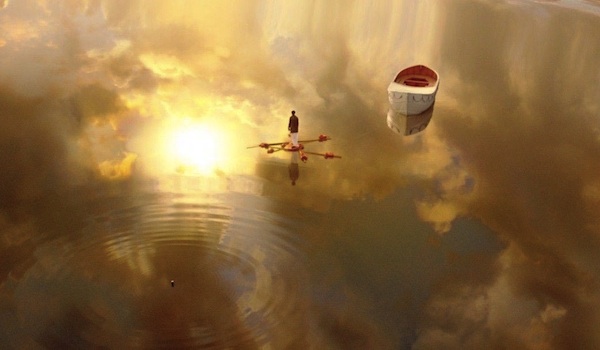Life of Pi Review
The main character in Ang Lee’s Life of Pi claims to have a story that’ll make you believe in God. To say that’s true would be to overstate its impact, but there is something miraculous about the film as a whole. Life of Pi was filmed on the water with a first-time actor playing against a 100% CGI tiger. That’s crazy, but hell, it works.
It’s a half hour into the film before the ship carrying Pi Patel (Suraj Sharma), his family, and the family’s many zoo animals sinks to the bottom of the Pacific Ocean. During those first 30 minutes, we meet an adult Pi (Irrfan Khan). He lives in Canada—his family’s intended destination those many years ago—where a writer (Rafe Spall) is asking him to recount his story.
It’s a tragic, but inspiring one. Pi is the only human survivor of the shipwreck, but he’s not alone. He’s forced to share his small lifeboat with a large Bengal tiger named Richard Parker. Pi is able to construct a small raft that he keeps tethered to the boat—in order to keep some space between he and Richard Parker—but more than anything, he feels betrayed. Pi has tried to lead a pious life. As a child, he shopped around for the right religion and, having not found one he liked above all others, he cherry picked his favorite aspects of Hinduism, Christianity, and Islam. So why would God do this to him? Why would He take away Pi’s family? Leave him to die on the ocean? Sic a hungry and cranky tiger on him?
There’s no question the most compelling material in Life of Pi occurs after the shipwreck and before we flash back to adult Pi in Canada. By framing the film the way he does, Lee strips away any doubt we might have about the outcome of Pi’s journey. That said, it’s still packed with suspense. Or maybe it’s an overwhelming sense of wonder. Regardless, both the visualization of this journey and its actual substance will, on multiple occasions, take your breath away.
Then, there’s that framing device. It’s more a momentum killer than a film killer. I didn’t object to the questions adult Pi raises in the film’s closing minutes. Quite the opposite, in fact. But the material leading up to the shipwreck (which itself is more understated than you might expect) tends to drag, and the material after his journey feels tacked on. As for the structure itself, it’s hackneyed to say the least.
There’s no topping the visuals in this film, however, and any trepidation one might have about the story or its structure should be allayed by the film’s stunning special effects and cinematographer Claudio Miranda’s choice of shots. Just the palette Lee uses—its brilliant orange sunrises and cool silver moonlight—will make your jaw drop. The tiger, however, is the film’s calling card. It’s extraordinarily realistic, and the way young Suraj Sharma interacts with this invisible creature is also noteworthy.
His entire performance, in fact, deserves praise. He’s asked to carry the film on his shoulders through its most inherently compelling moments, and when all is said and done, he succeeds at doing just that. At times, he’ll move you to tears. And yes, there are moments when his inexperience rears its ugly head, but the good here more than outweighs the bad. Without him, the film wouldn’t work. That its such a success is as much a testament to him as it is to Ang Lee or anyone else involved.
Life of Pi isn’t exactly “pro-faith,” but it does ultimately give its viewers a choice between two competing, but unequal (within the context of the movie) philosophies. It’s refreshing, though, to see a film speak to something like faith when so many big Hollywood pictures tiptoe around it or ignore it completely. Life of Pi‘s screenplay (courtesy of David Magee and based on the novel of the same name by Yann Martel) definitely isn’t its biggest asset, but in this respect, it’s admirable.
Mychael Danna’s score is among the best in 2012, and the way Pi’s entire journey is edited together contributes a welcome rhythm to the film as a whole. Ultimately, it’s just an expertly crafted motion picture on almost every level, but should we expect anything less from someone like Lee? He’s proven time and time again that he can turn any type of story into something special, and Life of Pi might be one of his best.
















